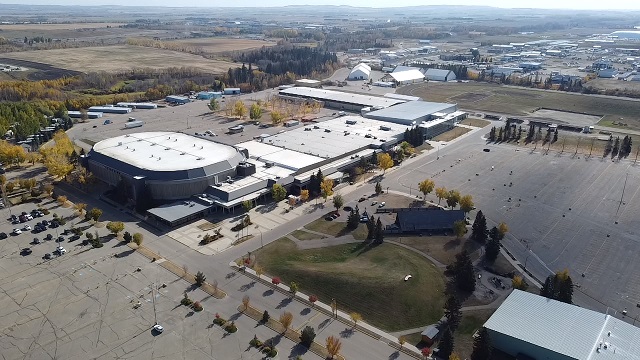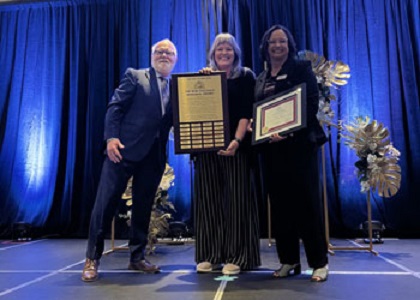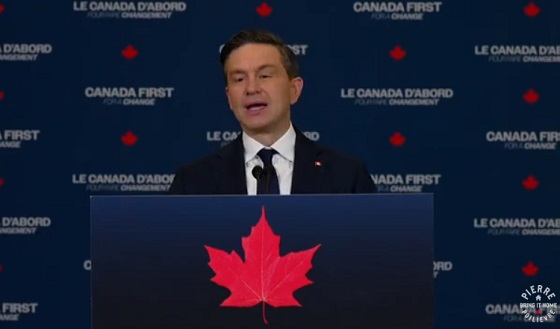Red Deer
Funding Secured for Westerner Park Amidst Government Review

Westerner Park welcomes a new sustainability assessment of regional agricultural societies initiated by the Government of Alberta. This study highlights the importance of regional agricultural societies to the province and the communities they serve.
In parallel, Westerner Park is proactively working towards self-sustainability with a strategic plan set to achieve this goal within three years. “This is a challenging but achievable goal for an organization of this size. With our dedicated team and clear strategy, I am confident we can find a path to sustainability,” said Shelly Flint, CEO of Westerner Park. To support this effort, four key supporters—the City of Red Deer, Red Deer County, the Westerner Park Foundation, and the Donald Family —have each committed $500,000 in interim funding.
John Donald highlighted the longstanding significance of Westerner Park to the community, noting, “Westerner Park has been a community cornerstone for over 130 years. It’s vital that we continue to engage in strong advocacy with all levels of government.”
“Supporting Westerner Park during this transitional period is crucial. The park’s events significantly benefit our community and economy,” said Mayor Ken Johnston, City of Red Deer. “Continuing these discussions with our government partners is imperative, we do not take this kind of assistance lightly; every aspect has been carefully considered.”
“Westerner Park continues to set the stage by fostering community growth through events that support agricultural initiatives, educational programs and various entertainment; while simultaneously acting as an economic driver by attracting visitors, creating job opportunities, and stimulating our local economy for the central region,” said Mayor Jim Wood, Red Deer County.
For more than a year, all parties have been collaboratively advocating for Westerner Park, the second-largest Agricultural Society in Alberta. This advocacy has not only underscored Westerner Park’s importance but also brought attention to the broader needs of other Agricultural Societies in Alberta.
The Government of Alberta is conducting a sustainability assessment of regional agricultural societies to determine how best to support agricultural societies and the work they do into the future.
“Regional agricultural societies are a huge part of Alberta, and I’m pleased to see other levels of government and community organizations stepping up to support this important community resource. The sustainability assessment will help us understand the challenges and opportunities regional ag societies face and better position our agriculture sector and rural communities for success,” said Agriculture and Irrigation Minister RJ Sigurdson.
Shelly Flint, CEO of Westerner Park, concluded, “Westerner Park remains committed to its mission of serving the community and enhancing local economic and cultural life. The ongoing support from our partners is vital as we navigate this review and work towards a sustainable future.”
ABOUT WESTERNER PARK
Westerner Park is Central Alberta’s largest tradeshow, agricultural, sports, entertainment, and convention facility. A not-for-profit organization and agricultural society, Westerner Park typically generates $150 million annually in economic activity, hosting over 1,500 events and 1.5 million visitors each year.
FUTURE PLANS
Westerner Park will continue to engage the community through events like the annual Westerner Days Fair & Exposition, agricultural shows, and various entertainment and educational programs.
From the Province of Alberta
Agricultural societies are part of the backbone of farm and rural communities. Alberta has seven regional agricultural societies in Camrose, Grande Prairie, Lethbridge, Lloydminster, Medicine Hat, Olds and Red Deer, and they play a huge role in their surrounding communities.
Regional agricultural societies are made up of Albertans who genuinely love their communities. They develop educational programs, organize major community or special events and provide services based on community needs. They run major facilities like trade centres and exhibition grounds for their people to enjoy.
To determine how best to support regional agricultural societies and the work they do into the future, the Government of Alberta has hired Deloitte to provide recommendations.
“Regional agricultural societies are a huge part of Alberta communities and a lot has changed since they were established more than a century ago. We know they do great work. Now we need to understand their challenges and opportunities to better position our agriculture sector and rural communities for success.”
Support for regional ag societies
In Budget 2024-25, Alberta’s government provided $11.5 million for the Agricultural Societies Grant Program, including $2.8 million to regional societies. The government also provides funding for agricultural societies to make major repairs to infrastructure through the Agricultural Societies Infrastructure Revitalization Program. In 2023, 34 agricultural societies received a total $2.5 million.
The study will be funded through the Sustainable Canadian Agricultural Partnership’s (Sustainable CAP) Resiliency and Public Trust program.
Sustainable CAP is a five-year, $3.5-billion investment by federal, provincial and territorial governments to strengthen competitiveness, innovation and resiliency in Canada’s agriculture, agri-food and agri-based products sector.
Quick facts
- Alberta has 291 agricultural societies, the most in Canada.
- Alberta is the first Canadian province to declare a special day for its agricultural societies.
- September 21 is Agricultural Societies Day in Alberta, recognizing the hard work of these volunteer-driven, non-profit organizations.
City of Red Deer
City of Red Deer Employee Honoured with Bob Stollings Memorial Award for Outstanding Contributions

Annette Scheper, Community & Program Facilitator in the Safe & Healthy Communities Department is The City’s 2025 recipient of the Bob Stollings Memorial Award.
The Bob Stollings Memorial Award is given out each year to a City employee who displays outstanding performance in alignment with The City’s RISE cornerstone values – respect, integrity, service and excellence. Nominations for the award are submitted by fellow coworkers detailing the employee’s achievements professionally and interpersonally, along with letters of support. The award is considered a great honour among City staff.
With an impressive 22-year career, Annette has played a pivotal role in shaping Red Deer’s cultural and special events landscape. Her leadership and innovation have brought thousands of successful events to life, creating lasting traditions that enrich the lives of residents. Her commitment to excellence and resourcefulness has ensured that community initiatives are inclusive, accessible, and impactful.
One of Annette’s most notable achievements is the development of the Community Loan Program, which provides essential resources for local groups, contributing an annual value of $86,778.95 back into the community. In addition, she has successfully led and executed a variety of large-scale events, demonstrating remarkable problem-solving skills and a dedication to sustainability. From creating elaborate event designs with repurposed materials to managing complex logistics, she continuously sets the standard for excellence.
“Annette exemplifies the best of our organization,” said City Manager, Tara Lodewyk. “Her unwavering dedication, innovative thinking, and ability to bring people together has made a profound impact on our city. This award is a testament to her hard work and passion for creating meaningful experiences for our community.”
The Bob Stollings Memorial Award was first established in 1985 and is presented every year to honour Robert (Bob) E. Stollings, a loyal and dedicated City employee from 1960-1984.
Health
Red Deer Hospital Lottery – Previous Supporter Draw Deadline!

|
|
|
|
|
|
-

 Autism2 days ago
Autism2 days agoRFK Jr. Exposes a Chilling New Autism Reality
-

 COVID-192 days ago
COVID-192 days agoCanadian student denied religious exemption for COVID jab takes tech school to court
-

 International2 days ago
International2 days agoUK Supreme Court rules ‘woman’ means biological female
-

 2025 Federal Election2 days ago
2025 Federal Election2 days agoNeil Young + Carney / Freedom Bros
-

 Health2 days ago
Health2 days agoWHO member states agree on draft of ‘pandemic treaty’ that could be adopted in May
-

 2025 Federal Election1 day ago
2025 Federal Election1 day agoTucker Carlson Interviews Maxime Bernier: Trump’s Tariffs, Mass Immigration, and the Oncoming Canadian Revolution
-

 Business1 day ago
Business1 day agoDOGE Is Ending The ‘Eternal Life’ Of Government
-

 espionage1 day ago
espionage1 day agoEx-NYPD Cop Jailed in Beijing’s Transnational Repatriation Plot, Canada Remains Soft Target










